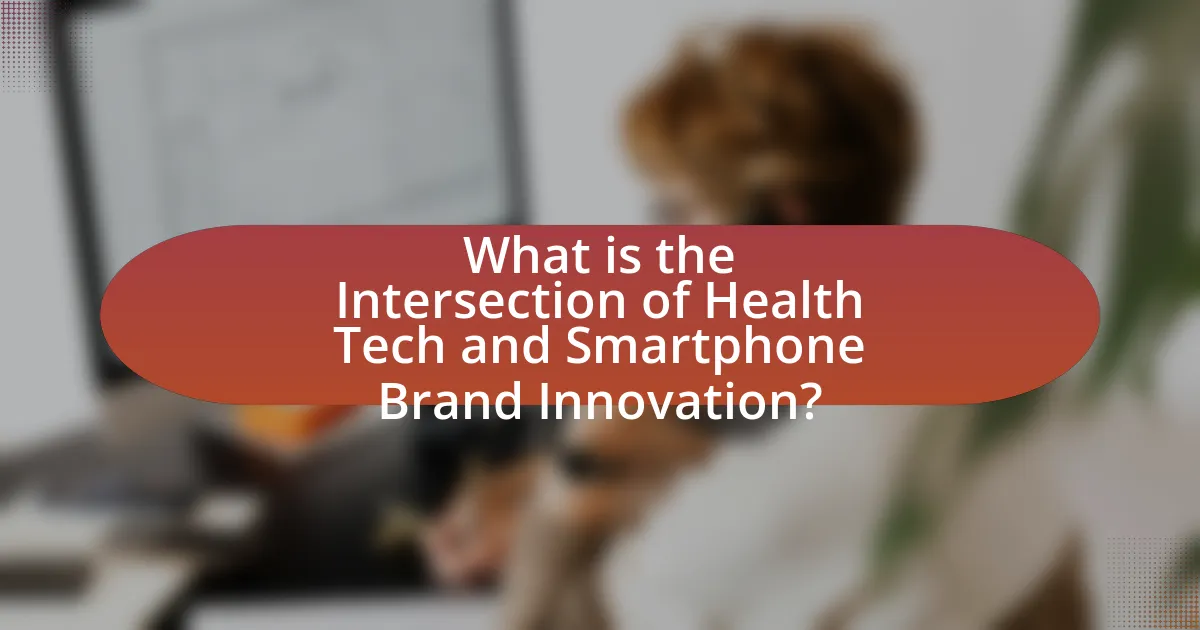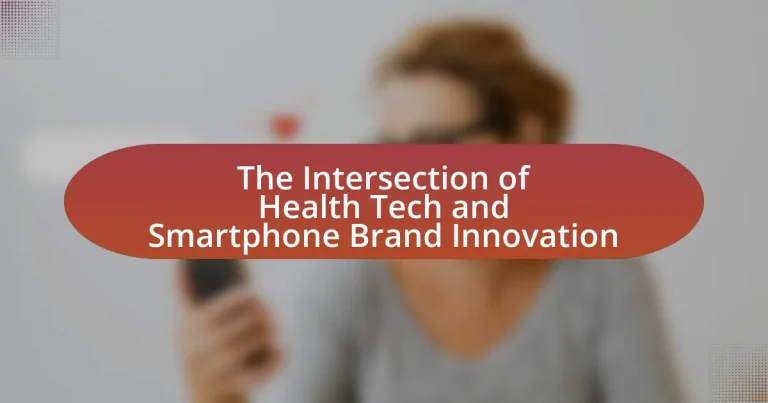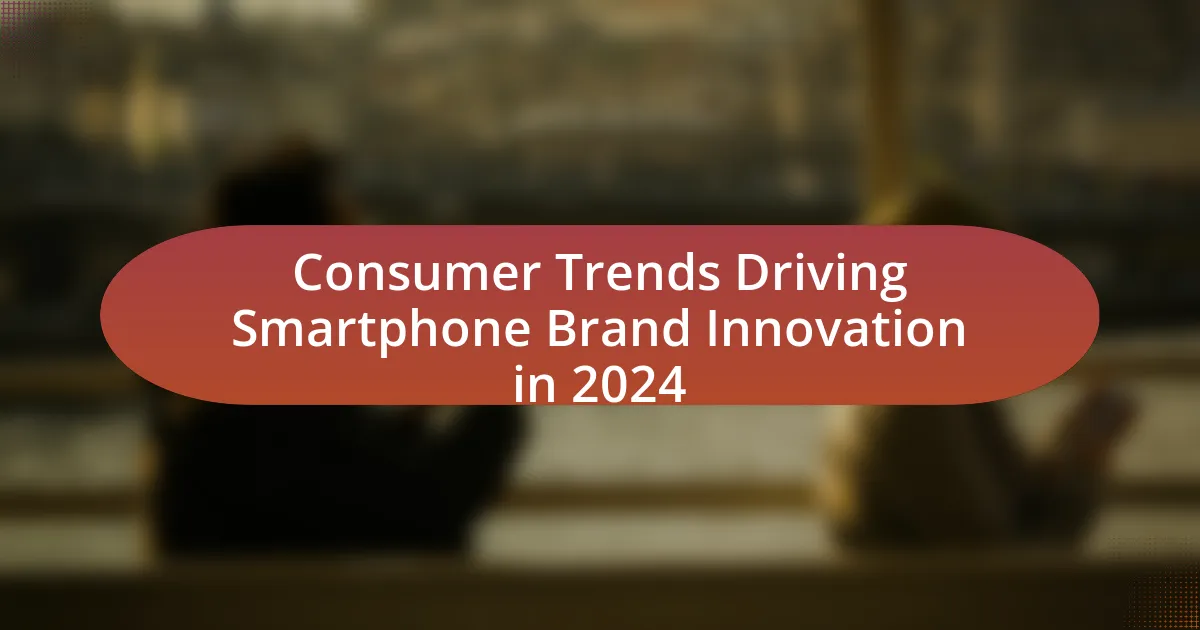The article examines the intersection of health technology and smartphone brand innovation, highlighting how major smartphone manufacturers like Apple and Samsung are integrating advanced health monitoring features into their devices. Key topics include the influence of health tech advancements on brand strategies, specific health features such as heart rate monitors and sleep tracking, and the importance of regulatory compliance and data privacy. The article also discusses consumer demands for personalized health solutions, the role of artificial intelligence in enhancing health tech, and future prospects for innovation in this rapidly evolving market. Overall, it underscores the growing significance of health tech in shaping smartphone functionalities and consumer engagement.

What is the Intersection of Health Tech and Smartphone Brand Innovation?
The intersection of health tech and smartphone brand innovation lies in the integration of advanced health monitoring features into smartphones, enhancing user health management. Smartphone brands, such as Apple and Samsung, have innovated by incorporating health-related functionalities like heart rate monitoring, sleep tracking, and fitness applications directly into their devices. For instance, Apple’s Health app aggregates data from various health metrics, allowing users to monitor their health comprehensively. This integration not only promotes user engagement with health management but also drives smartphone sales by appealing to health-conscious consumers. The global health tech market is projected to reach $660 billion by 2025, indicating a significant demand for such innovations within smartphone technology.
How do health tech advancements influence smartphone brand strategies?
Health tech advancements significantly influence smartphone brand strategies by driving the integration of health-related features into devices. As consumers increasingly prioritize health and wellness, smartphone brands adapt their offerings to include advanced health monitoring capabilities, such as heart rate sensors, sleep tracking, and fitness applications. For instance, Apple has incorporated health features into its iPhone and Apple Watch, leading to a 25% increase in sales of wearables in 2020, as reported by IDC. This trend compels brands to innovate continuously, ensuring their devices meet the evolving demands of health-conscious consumers while also differentiating themselves in a competitive market.
What specific health tech features are integrated into smartphones?
Smartphones integrate several specific health tech features, including heart rate monitors, sleep tracking, step counters, and blood oxygen level sensors. These features utilize built-in sensors and software applications to provide users with health-related data. For instance, heart rate monitors use photoplethysmography technology to measure heartbeats, while sleep tracking algorithms analyze movement and sound to assess sleep quality. Additionally, step counters leverage accelerometers to track physical activity, and blood oxygen sensors employ light-based technology to measure oxygen saturation levels in the blood. These integrated features enhance user engagement with personal health management and contribute to the growing trend of mobile health applications.
How do smartphone brands prioritize health tech in their product development?
Smartphone brands prioritize health tech in their product development by integrating advanced health monitoring features and collaborating with health organizations. For instance, companies like Apple and Samsung have incorporated sensors for heart rate monitoring, ECG capabilities, and blood oxygen level tracking into their devices. This focus is evidenced by Apple’s HealthKit and Samsung’s Health platform, which allow third-party developers to create health-related applications, enhancing the ecosystem of health tech. Additionally, the World Health Organization’s emphasis on digital health solutions has influenced brands to invest in technologies that promote user wellness, reflecting a growing trend in the industry towards prioritizing health functionalities in smartphones.
Why is the integration of health tech important for smartphone brands?
The integration of health tech is crucial for smartphone brands because it enhances user engagement and expands market reach. By incorporating health monitoring features, such as heart rate tracking and fitness apps, smartphone brands can attract health-conscious consumers, tapping into the growing wellness market, which is projected to reach $4.24 trillion by 2026. This integration not only differentiates products in a competitive landscape but also fosters brand loyalty as users increasingly rely on their devices for health management.
What consumer demands drive the need for health tech in smartphones?
Consumer demands driving the need for health tech in smartphones include the desire for personalized health monitoring, convenience in accessing health data, and the increasing focus on preventive healthcare. Personalized health monitoring is evidenced by the rise in wearable devices and apps that track metrics such as heart rate, sleep patterns, and physical activity, allowing users to tailor their health regimens. Convenience is highlighted by the integration of health features into smartphones, enabling users to access their health information quickly and easily without needing separate devices. The focus on preventive healthcare is supported by statistics showing that consumers are increasingly seeking tools that help them manage their health proactively, with a report from Deloitte indicating that 70% of consumers are interested in using technology to improve their health outcomes.
How does health tech integration enhance brand loyalty among users?
Health tech integration enhances brand loyalty among users by providing personalized experiences and improved health outcomes. When brands incorporate health technology, such as fitness tracking or telehealth services, they create a more engaging and relevant user experience. This integration fosters a sense of trust and reliance on the brand, as users perceive it as a partner in their health journey. Research indicates that 70% of consumers are more likely to remain loyal to brands that offer personalized health solutions, demonstrating that tailored services significantly impact user retention and satisfaction.

What are the key trends in Health Tech and Smartphone Brand Innovation?
Key trends in Health Tech and Smartphone Brand Innovation include the integration of advanced health monitoring features in smartphones, such as wearable technology and AI-driven health applications. For instance, companies like Apple and Samsung have developed devices that track vital signs, fitness metrics, and even mental health indicators, enhancing user engagement and health management. Additionally, the rise of telehealth services has accelerated due to the COVID-19 pandemic, leading smartphone brands to incorporate features that facilitate remote consultations and health data sharing. According to a report by Grand View Research, the global telehealth market is expected to reach $636.38 billion by 2028, highlighting the growing importance of health tech in smartphone innovation.
How are smartphone brands adapting to emerging health tech trends?
Smartphone brands are integrating advanced health technologies into their devices to meet the growing demand for health monitoring and wellness features. For instance, companies like Apple and Samsung have incorporated health sensors, such as heart rate monitors and blood oxygen sensors, into their smartphones and smartwatches, enabling users to track vital health metrics conveniently. According to a report by Statista, the global health and fitness app market is projected to reach $14 billion by 2026, indicating a significant consumer interest in health tech. Additionally, brands are collaborating with health organizations to ensure compliance with health regulations and to enhance the credibility of their health-related features. This strategic adaptation not only aligns with consumer trends but also positions smartphone brands as key players in the health tech landscape.
What role does artificial intelligence play in health tech features of smartphones?
Artificial intelligence enhances health tech features of smartphones by enabling advanced data analysis, personalized health insights, and real-time monitoring. AI algorithms process vast amounts of health data collected from sensors and apps, allowing for accurate tracking of vital signs, activity levels, and sleep patterns. For instance, AI-driven applications can analyze heart rate variability to detect potential health issues, providing users with actionable insights. Research shows that AI can improve diagnostic accuracy in mobile health applications, with studies indicating that AI algorithms can outperform human experts in certain diagnostic tasks. This integration of AI in health tech not only improves user engagement but also fosters proactive health management, ultimately leading to better health outcomes.
How are wearable devices influencing smartphone health tech innovations?
Wearable devices are significantly influencing smartphone health tech innovations by driving the integration of advanced health monitoring features into smartphones. This integration allows smartphones to leverage data collected from wearables, such as heart rate, sleep patterns, and physical activity, to provide users with comprehensive health insights. For instance, the Apple Watch has prompted Apple to enhance its Health app, enabling users to track various health metrics directly on their smartphones, thereby creating a seamless ecosystem for health management. Additionally, a report from Statista indicates that the global wearable health tech market is expected to reach $60 billion by 2023, underscoring the growing demand for such innovations and their impact on smartphone development.
What challenges do smartphone brands face in integrating health tech?
Smartphone brands face significant challenges in integrating health tech, primarily due to regulatory compliance, data privacy concerns, and technological limitations. Regulatory compliance is crucial as health tech must adhere to strict guidelines set by health authorities, which can vary by region and complicate product development. Data privacy concerns arise from the sensitive nature of health information, necessitating robust security measures to protect user data and comply with regulations like GDPR and HIPAA. Additionally, technological limitations, such as the need for accurate sensors and reliable software, can hinder the effective integration of health tech features into smartphones. These challenges collectively impact the ability of smartphone brands to innovate and deliver reliable health tech solutions.
How do regulatory issues impact health tech features in smartphones?
Regulatory issues significantly impact health tech features in smartphones by dictating compliance standards that manufacturers must meet. These regulations, such as the Health Insurance Portability and Accountability Act (HIPAA) in the United States, require that any health-related data collected by smartphones is securely stored and transmitted, influencing the design and functionality of health apps. For instance, smartphone manufacturers must implement robust encryption and data protection measures to ensure user privacy, which can limit the types of features that can be offered. Additionally, regulatory bodies may require extensive testing and validation of health tech features, delaying product launches and increasing development costs. This regulatory landscape shapes the innovation trajectory of health tech in smartphones, as companies must balance compliance with user demand for advanced health monitoring capabilities.
What are the privacy concerns associated with health tech in smartphones?
Privacy concerns associated with health tech in smartphones primarily include data security, unauthorized access, and user consent. Health applications often collect sensitive personal information, such as medical history and biometric data, which can be vulnerable to breaches. For instance, a 2020 report by the Identity Theft Resource Center indicated that healthcare data breaches increased by 25% compared to the previous year, highlighting the risks involved. Additionally, many users may not fully understand the privacy policies of health apps, leading to unintentional consent for data sharing with third parties. This lack of transparency raises significant ethical concerns regarding user autonomy and data ownership.

What are the future prospects for Health Tech and Smartphone Brand Innovation?
The future prospects for Health Tech and Smartphone Brand Innovation are highly promising, driven by advancements in technology and increasing consumer demand for integrated health solutions. Health tech is expected to see significant growth, with the global digital health market projected to reach $508.8 billion by 2027, according to a report by Fortune Business Insights. This growth is fueled by the rising adoption of wearable devices, telehealth services, and mobile health applications that enhance patient engagement and monitoring.
Smartphone brands are innovating by incorporating health features into their devices, such as advanced sensors for tracking vital signs and health metrics. For instance, Apple’s introduction of health monitoring features in the Apple Watch has set a precedent for other smartphone manufacturers to follow. As a result, companies like Samsung and Google are also investing in health-related functionalities, which indicates a trend towards a more health-centric approach in smartphone design.
Moreover, the integration of artificial intelligence and machine learning in health tech applications is expected to improve diagnostics and personalized treatment plans, further enhancing the value proposition of smartphones in health management. This convergence of health tech and smartphone innovation is likely to create new business models and partnerships, ultimately transforming how consumers manage their health.
How will advancements in health tech shape the future of smartphones?
Advancements in health tech will significantly enhance smartphone capabilities by integrating advanced health monitoring features. These features will include real-time biometric tracking, such as heart rate, blood pressure, and glucose levels, directly through smartphones, making health management more accessible. For instance, the introduction of sensors and AI algorithms in smartphones can enable continuous health monitoring, which has been shown to improve patient outcomes by facilitating early detection of health issues. According to a study published in the Journal of Medical Internet Research, mobile health applications can lead to better adherence to treatment plans and improved health literacy among users. Thus, the future of smartphones will be increasingly defined by their role as essential health management tools, driven by ongoing innovations in health technology.
What potential innovations can we expect in health monitoring through smartphones?
Potential innovations in health monitoring through smartphones include advanced biometric sensors, AI-driven health analytics, and integration with telemedicine platforms. Advanced biometric sensors, such as those capable of measuring blood glucose levels non-invasively, are being developed to provide real-time health data. AI-driven health analytics can analyze user data to predict health issues, offering personalized recommendations based on individual health patterns. Furthermore, the integration of smartphones with telemedicine platforms allows for seamless communication between patients and healthcare providers, enhancing remote monitoring capabilities. These innovations are supported by ongoing research and development in health technology, demonstrating a clear trend towards more sophisticated and user-friendly health monitoring solutions.
How might smartphone brands collaborate with health tech companies in the future?
Smartphone brands may collaborate with health tech companies by integrating advanced health monitoring features into their devices. This collaboration could involve the development of sensors that track vital signs, such as heart rate and blood oxygen levels, directly through smartphones. For instance, Apple has already partnered with health tech firms to enhance its HealthKit platform, allowing third-party apps to access health data and provide personalized health insights. Such partnerships can lead to improved user engagement and expanded market reach, as evidenced by the growing demand for wearable health technology, which is projected to reach $60 billion by 2023.
What best practices should smartphone brands follow for successful health tech integration?
Smartphone brands should prioritize user privacy and data security for successful health tech integration. Ensuring that health data is encrypted and compliant with regulations like HIPAA fosters user trust and encourages adoption. Additionally, brands should collaborate with healthcare professionals to develop accurate and reliable health applications, as studies show that user engagement increases when apps are clinically validated. Furthermore, integrating user-friendly interfaces and providing clear health insights can enhance user experience, leading to higher retention rates. Research indicates that 70% of users prefer health apps that offer personalized feedback, demonstrating the importance of customization in health tech solutions.
How can brands effectively communicate health tech benefits to consumers?
Brands can effectively communicate health tech benefits to consumers by utilizing clear, relatable messaging that highlights specific advantages, such as improved health outcomes and enhanced convenience. For instance, brands can showcase real-life testimonials and case studies demonstrating how their health tech products have positively impacted users’ lives. Research indicates that 70% of consumers are more likely to trust brands that provide transparent information about product benefits and user experiences. Additionally, leveraging digital platforms for interactive content, such as videos and infographics, can enhance understanding and engagement, making the benefits of health tech more accessible and appealing to a broader audience.
What strategies can enhance user engagement with health tech features?
To enhance user engagement with health tech features, implementing personalized user experiences is crucial. Personalization can be achieved through tailored content, adaptive interfaces, and user-specific health insights, which have been shown to increase user satisfaction and retention. For instance, a study published in the Journal of Medical Internet Research found that personalized health interventions led to a 30% increase in user engagement compared to generic approaches. Additionally, integrating gamification elements, such as rewards and challenges, can motivate users to interact more frequently with health tech features, as evidenced by research from the American Journal of Preventive Medicine, which reported that gamified health apps saw a 50% increase in user activity.




